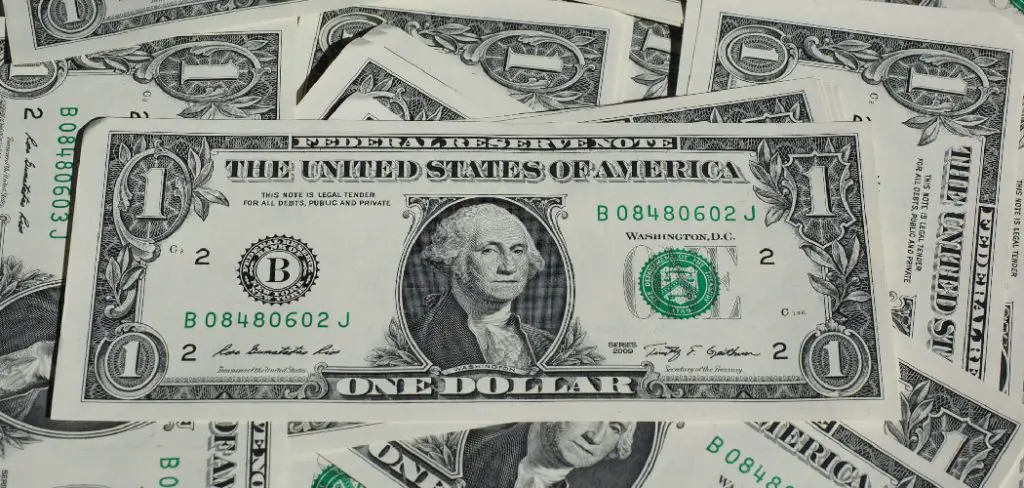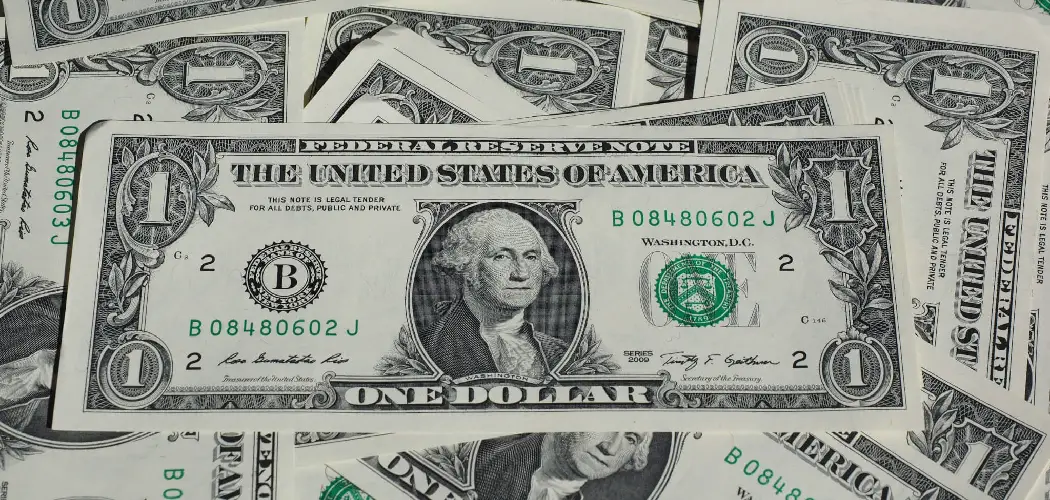To store paper money long term, use acid-free materials and keep the currency in a dry and cool place. Ensuring that paper money remains in good condition is essential for collectors and investors alike.
Storing the currency in an appropriate manner can help prevent damage and preserve its value. Exposure to sunlight, heat, humidity, and dust can cause gradual wear and tear on notes, with potentially long-lasting effects. Therefore, it’s important to choose the right materials for storage and consider the conditions of the storage location.
This article will provide some guidelines on how to store paper money long-term, from materials to settings, to help keep your collection secure.

Why Secure Storage Is Important For Paper Money
Paper money is an integral part of our daily lives, whether it’s for buying groceries or making big investments. It has been around for centuries, and in the digital age today, it still holds its value. However, storing and protecting it is crucial.
In this blog post, we will discuss how to store paper money long term and why secure storage is essential in today’s world.
Explanation Of The Risks Associated With Improper Storage
Improper storage of paper money can result in several risks, including:
- Fading and discolouration: Prolonged exposure to light can cause the colours on the banknotes to fade and become dull, causing them to lose value.
- Damage from moisture and humidity: If banknotes are stored in a humid environment, moisture can cause the paper to stick together, leading to mould growth on the notes.
- Tears and creases: Paper money can readily be damaged if it is folded, creased or bent regularly.
- Insects and rodents: If not stored in a secure location, insects and rodents can damage the currency, chewing or burrowing holes in them.
The Impact Of Natural Disasters And Theft On Paper Money
Natural disasters such as floods, hurricanes, and earthquakes can ruin paper money. If banknotes are exposed to water or extreme temperatures, they can become damaged beyond repair. Similarly, theft is a significant risk when it comes to storing paper currency.
Some tips to store your paper money securely are:
- Safe storage: Use a bank locker or a home safe to store your banknotes. If you keep your currency at home, place it in a fireproof and waterproof container resistant to floods and other natural disasters.
- Avoid storing in direct sunlight: Store your banknotes in a cool and dry environment, away from sunlight and any heat sources.
- Limit handling: The more you handle paper money, the more its quality deteriorates. Limit the handling and avoid folding or bending the banknotes.
- Regular checking: Inspect your paper money regularly to identify any signs of deterioration, fading or insect damage.
Keeping your paper currency secure is imperative. Choose a safe storage location, minimize handling and inspect your notes regularly. By following these tips, you can ensure your paper money retains its value for years to come.
Understanding Different Types Of Secure Storage Options
When it comes to keeping paper money long-term, it’s crucial to have a secure storage option. Different types of storage options are available, ranging from safe deposit boxes to fireproof containers that can keep your paper money safe from theft, damage and fire.
We will explore the essential aspects of each type of secure storage option, and how they can be useful for long-term paper money storage.
Safe Deposit Boxes
Safe deposit boxes are secure storage boxes stored in banks that are an excellent option for storing paper money for the long-term. Here are some key features of safe deposit boxes:
- They come in various sizes to fit different storage needs.
- Only authorized individuals can access the boxes.
- They are generally located within a bank, meaning they have an added security layer that protects the paper money from burglaries or thefts.
- The boxes are made from robust materials to ensure that the paper money is safe from any external damages such as fire and water.
A safe deposit box is a perfect solution for individuals that want to ensure their paper money is secure while storing it in a centralized location close to their homes.
Home Safes
Home safes are another secure storage option designed to keep paper money secure for the long-term. Here are some key features of home safes:
- They come in many sizes small and big, depending on the homeowner’s preference.
- They are perfect for individuals that need regular access to their paper money.
- Home safes are designed to protect the paper money from burglaries and thefts, however, they are not entirely fireproof.
- Home safes are relatively affordable, making them a great addition to any home security system.
Home safes are perfect for individuals that want a secure storage option close to them while ensuring that they can access their paper money anytime they wish.
Fireproof Containers
Fireproof containers are storage options made from fire-resistant materials that keep paper money safe from any fire damages. Here are their key features:
- They are available in different sizes to fit different storage needs.
- They are made from materials designed to withstand high temperatures and fire.
- Fireproof containers can last up to two hours without any damages from fire.
- They are relatively affordable and come in many sizes.
Fireproof containers are perfect for individuals who want to store their paper money in a location close to their homes and ensure that it is safe from any fire damages.
Understanding different types of secure storage options plays an essential role in keeping paper money safe for the long-term. While safe deposit boxes are the most secure option, home safes and fireproof containers are other solutions for individuals looking to store their paper money securely.
By selecting the right storage option, individuals can make sure that their money stays secure and in excellent condition for future use.
Factors To Consider When Choosing Secure Storage For Paper Money
How to store paper money long term: factors to consider when choosing secure storage for paper money
Whether you are a passionate collector or simply have paper money that you want to keep safe for long-term storage, choosing secure storage is essential. Factors such as size and capacity, insurance, ease of access, location, and cost are crucial to consider when deciding on a storage option for paper money.
Below are the key considerations for each factor.
Size And Capacity
- The size and the capacity of the storage space are crucial. You must choose an option with enough space to hold all of your paper money, whether it is for everyday storage or long-term storage.
- Choose a secure storage space that can protect your paper money from damage and deterioration, such as humidity and sunlight.
- The storage space should be designed with high-quality materials that can protect your paper money from external factors.
Insurance
- Insurance is crucial when storing your paper money. Choose a storage facility that offers insurance or opt for separate insurance coverage for your paper money.
- Look for a policy that has minimal restrictions and guarantees adequate protection for your banknotes.
- Ensure that you store your paper money in accordance with the insurance company’s requirements to avoid voiding your insurance policy.
Ease Of Access
- Choose a storage option that offers easy access to your paper money when needed.
- Consider the time it will take to access your paper currency, especially if you need to retrieve them quickly.
- Choose a storage facility that provides secure and easy access to your paper money when you need it, and ensure that only authorized personnel can access the space.
Location
- Location is essential when determining the long-term storage of your paper money.
- Choose a location that is secure and safe, with minimal exposure to external factors such as weather and natural disasters.
- Ensure the location is conveniently situated to allow for easy access when required.
Cost
- Cost is a critical consideration when choosing secure storage for your paper money.
- Compare the costs of different storage options to ensure that you find a secure and affordable solution.
- Don’t compromise the safety and security of your paper money for cost. Choose a storage option that offers top-grade security features, even if it costs more.
Secure storage for paper money involves carefully considering several factors, including size, capacity, insurance, ease of access, location, and cost. Make informed decisions to ensure that your valuable paper money is adequately protected and preserved for future generations.
Best Practices For Securely Storing Paper Money
Paper money is not only a valuable asset, but it is also a fragile one. Exposure to moisture, heat, and light can devalue and damage the currency over time. Here are some best practices for keeping your paper money secure:
Proper Handling And Cleaning Techniques
Handling paper money improperly can drastically decrease its value. Here are some key points to consider:
- Avoid touching paper money with bare hands, as the oil and dirt on your skin can damage its surface.
- Use gloves when handling paper money, and make sure they are made of nonreactive materials.
- Do not write on paper money or use adhesive tape on it.
- Clean paper money carefully using a soft-bristled brush or compressed air. Never try to clean paper money with water or any type of cleaning solution.
How To Organize And Label Your Storage Containers
Proper organization and labeling of storage containers can help you find specific notes easily and prevent damage to the currency. Here are some tips to keep in mind:
- Store currency in clear plastic sleeves or holders that are free of pvc, acid, or other harmful chemicals.
- Use archival-grade folders or envelopes to store larger notes.
- Label each container or folder clearly with the denominations, year the currency was issued, and any other relevant information.
- Sort the currency according to condition or value.
Tips For Maintaining The Longevity Of Your Paper Money
If stored properly, paper money can last for generations, maintaining its quality and value. Here are some tips for ensuring the longevity of your paper money:
- Store paper money in a cool, dry place away from direct sunlight, heat sources, and moisture.
- Avoid storing paper money in areas with high humidity or temperature fluctuations.
- Use uv-resistant sleeves or display cases for valuable or rare notes to protect them from sunlight.
- Rotate paper money in storage containers to avoid prolonged contact with one area.
- Handle paper money with care and avoid unnecessary touching or movement.
By following these best practices, you can maintain the quality and value of your paper money for years to come.
How To Properly Store And Transport Paper Money For Long-Term Preservation
How to properly store and transport paper money for long-term preservation
Paper money is a valuable asset that requires proper preservation for long-term storage and use. Whether you are collecting banknotes or keeping important cash, securing your paper money requires specific guidelines to maintain its value over time.
The Role Of Humidity And Temperature Control
Humidity and temperature play an essential role in the longevity of paper money. The ideal temperature for storing paper money ranges from 60 to 70 degrees fahrenheit, with relative humidity kept between 30 and 40 percent. Here are some things to keep in mind:
- High humidity can cause notes to deteriorate quickly due to mold and mildew growth.
- High temperatures can cause notes to fade, discolor, and lose their crispness.
- Avoid storing paper money in areas prone to extreme temperature changes, such as attics and basements.
Best Practices For Packing Paper Money
Proper packing is essential to preserve the quality and condition of paper money when storing it long-term. Consider using the following best practices:
- Store paper money in individual holders, such as archival-quality plastic sleeves or mylar.
- Use acid-free paper folders to secure paper currency collections.
- Avoid storing paper money in direct sunlight, high humidity, or areas that experience temperature fluctuations.
How To Transport Paper Money For Relocation Or Emergency Situations
Transporting your paper money safely requires sufficient preparation to ensure its protection from damage, loss, or theft. Here are some best practices to follow:
- Use a fireproof and waterproof safe or container to transport paper money.
- Include label boxes or envelopes clearly indicating what type of notes they contain.
- Avoid transporting paper money with other valuables, and ensure it is kept secure and hidden during travel.
By following these guidelines, you can ensure the preservation of your paper money, whether it’s for collection or storage. By keeping these valuable assets in pristine condition, they can retain their value, usability and history over time.
Frequently Asked Questions Of How To Store Paper Money Long Term
How Can I Protect Paper Money From Damage?
To keep your paper money in good condition, store it in a cool, dry place away from sunlight and moisture. Use acid-free paper or mylar sleeves to protect individual bills, and avoid touching them with your bare hands as much as possible.
Is It Safe To Store Paper Money In A Safe Deposit Box?
Yes, a safe deposit box is one of the safest places to store paper money long-term. Just be sure to check on your box periodically to ensure the bills haven’t been damaged or affected by mold or mildew.
Should I Use Plastic Or Paper Sleeves To Store Paper Money?
It’s best to use mylar sleeves instead of plastic or paper sleeves. Mylar is a type of polyester film that is archival safe and will not damage the bill over time. Avoid using anything with pvc, as it can release harmful gases and damage the currency.
Can Paper Money Be Damaged By Humidity?
Yes, high levels of humidity can cause paper money to become limp, moldy, or even stick together over time. To prevent this, store your paper money in a cool, dry place away from moisture.
Can Paper Money Be Damaged By Direct Sunlight?
Yes, exposure to direct sunlight can cause paper money to fade or discolor over time. To keep your bills looking their best, store them in a dark or low-light environment. If you must display them, use uv-protective glass.
How Often Should I Check On My Paper Money In Storage?
It’s a good idea to check on your paper money in storage every six months to ensure the bills haven’t been damaged or affected by mold or mildew. Be gentle when handling the bills, and avoid touching them with your bare hands.
Conclusion
So, there you have it – everything you need to know about storing paper money long term. Remember, paper money is a valuable asset that can become even more valuable with age. Therefore, it’s crucial to store it properly to ensure its longevity and protect it from damage.
Proper storage techniques may require a bit of investment, but it will be worth it in the long run. Ensure that you keep your notes in a dry and cool environment, away from direct sunlight, moisture, and fluctuating temperatures. Make sure to handle them with care and use appropriate storage tools such as acid-free holders and albums.
Additionally, it’s essential to maintain a proper record of your notes to keep track of their value and condition. By following these tips, you can ensure that your paper money remains in mint condition for years to come.

